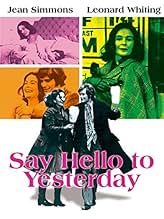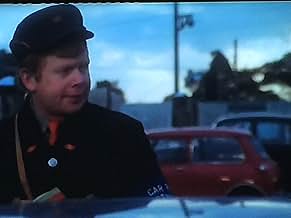VALUTAZIONE IMDb
5,8/10
212
LA TUA VALUTAZIONE
Aggiungi una trama nella tua linguaAn affluent, middle-aged housewife in a failing marriage is romantically pursued by a young man while running errands in London.An affluent, middle-aged housewife in a failing marriage is romantically pursued by a young man while running errands in London.An affluent, middle-aged housewife in a failing marriage is romantically pursued by a young man while running errands in London.
- Regia
- Sceneggiatura
- Star
Ben Aris
- Floor Walker
- (non citato nei titoli originali)
Tom Chadbon
- Man
- (non citato nei titoli originali)
John Challis
- Shop Salesman
- (non citato nei titoli originali)
Carla Challoner
- Au Pair girl
- (non citato nei titoli originali)
Constance Chapman
- Boy's mother
- (non citato nei titoli originali)
Ellis Dale
- Train passenger
- (non citato nei titoli originali)
Roy Evans
- Father's Friend
- (non citato nei titoli originali)
Harry Fielder
- Bus Conductor
- (non citato nei titoli originali)
Jimmy Gardner
- Balloon seller
- (non citato nei titoli originali)
Recensioni in evidenza
Maybe it's a coincidence that the film careers of the leading players Whiting and Simmonds were brought to an end after this film.In the case of Whiting he made the decision,quite wisely from this appearance,to concentrate on the stage.In the case of Simmonds age caught up with her and she subsequently divided her time between the stage and TV movies.The problem with this film is that the characters and the story is just unsustainable.Whitings character is an excruciating bore.When he is on screen it is like someone is drawing their nails down a blackboard.Simmonds is a bored housewife who is more likely to give him a kick were it hurts rather than play along with him.The films only moment of interest is when they go to the flat of Simmonds mother who is played by Evelyn Laye.Also note at the beginning there is no snow at the beginning of the film.At Cobham station it is thick on the ground,and when the train arrives at Victoria there is no snow.
May-September romance, this time with the woman in her autumnal years. "Prim and proper" housewife Jean Simmons, apparently stuck in a stale marriage to a stocks analyst near London, is chased madly all over town by gregarious younger man Leonard Whiting, who fancies her. Once she relents and they get to the bedroom, Whiting tells her, "You're Mata Hari, Candy, and Barbarella all rolled into one", and yet we never sense that. Director Alvin Rakoff, who also co-authored the script with Peter King, hands us characters on a meet-cute platter with hardly any exposition. Usually that's fine with me--the less talky introductory material, the better--however, in this case it backfires. We don't see the attraction between these two people, and when Simmons suddenly starts defending her husband and his prowess in bed, it feels like a cheat. Whiting, then a hot commodity following Zeffirelli's "Romeo and Juliet", is convincing as a carefree youth longing for non-conformist kicks, but when the scenario grows solemn--as with a confusingly presented trip to the hospital--Whiting laughably stiffens, becoming melodramatically misty. Rakoff also does the handsome Whiting a disservice in the final act, staging a serious discussion between the lovers while keeping Whiting ridiculously wrapped in a tangerine-colored bed sheet! Simmons does what she can with a sketchy character, but there are few surprises from the actress (who had played this type of role too often before). The age difference is brought up but not examined; Rakoff seems more intrigued by Simmons' distaste in the young man's unemployment status--definitely not a reaction the audience can warm up to. Riz Ortolani's pretty music and Geoffrey Unsworth's cinematography help keep the film interesting and tolerable, but by the end it has become laborious. ** from ****
One of the most underrated British films that was produced on the cusp, between the end of the swinging sixties and the beginning of the hippy seventies. Leonard Whiting (Romeo from Franco Zeffirelli's Romeo and Juliet) plays a young dreamer who is trapped in a working class existence: living in a council house with a father who has no horizon higher than working in the local factory. Jean Simmons is the mature woman, living in a leafy Surrey house with her stockbroker husband and two children, but desperately unhappy with her life. When the two unlikely lovers meet on a train to London, Whiting ignores the come-on from Susan Penhaligon by saying 'today I am going to climb Mount Everest,' and so begins his charm offensive of the mature woman across London's 1970s landscape. Beautifully written and with expert filming by Geoffrey Unsworth, Say Hello to Yesterday is one of the most insightful films ever to deal with the thrill and inevitable puncturing of the balloon that signifies the love affair between these two protagonists.
Normally I don't go in for May-December romances when the man takes the December slot, but for the sake of Jean Simmons, I decided to give Say Hello to Yesterday a shot. Really, though; does anyone really want to see Romeo seduce a woman old enough to be his mother? Leonard Whiting is supposed to be young and Romeo-ish forever. Instead, in this movie, he's weird and obnoxious, and tumbling around in a hotel room in the afternoon.
Thanks to The Happy Ending (which is thanks to Life at the Top), Jean Simmons got typecast as a bored housewife who isn't happy in the bedroom. It's a far cry from her typecast in the 1950s as Sister Sarah! So, in this movie, she goes out for the day and suddenly has the desire to cheat on her wealthy, devoted husband. There's really no reason, no intense chemistry, and no meaningful bond between them. She just sees him acting silly on the train, and she allows his inappropriate behavior to get out of control.
Most of this movie is very silly and very 1970s, but Jean does have one extremely well acted scene. It makes up for the lack of realism, but it doesn't actually turn it into a good movie.
Thanks to The Happy Ending (which is thanks to Life at the Top), Jean Simmons got typecast as a bored housewife who isn't happy in the bedroom. It's a far cry from her typecast in the 1950s as Sister Sarah! So, in this movie, she goes out for the day and suddenly has the desire to cheat on her wealthy, devoted husband. There's really no reason, no intense chemistry, and no meaningful bond between them. She just sees him acting silly on the train, and she allows his inappropriate behavior to get out of control.
Most of this movie is very silly and very 1970s, but Jean does have one extremely well acted scene. It makes up for the lack of realism, but it doesn't actually turn it into a good movie.
Lo sapevi?
- QuizJohn Challis and Alan Rolfe and two other cast members are dubbed by Robert Rietty.
- BlooperWhen they are in the playground, a young girl who was wearing red tights and a blue coat fell and was taken by her caregiver to first aid. During several subsequent shots, she is seen playing in the background (during the sandbox scene and the slide scene.) Then, she is seen returning from first aid with her caregiver.
I più visti
Accedi per valutare e creare un elenco di titoli salvati per ottenere consigli personalizzati
Dettagli
- Tempo di esecuzione1 ora 36 minuti
- Mix di suoni
- Proporzioni
- 1.78 : 1
Contribuisci a questa pagina
Suggerisci una modifica o aggiungi i contenuti mancanti

Divario superiore
By what name was Il ragazzo e la quarantenne (1971) officially released in India in English?
Rispondi


















